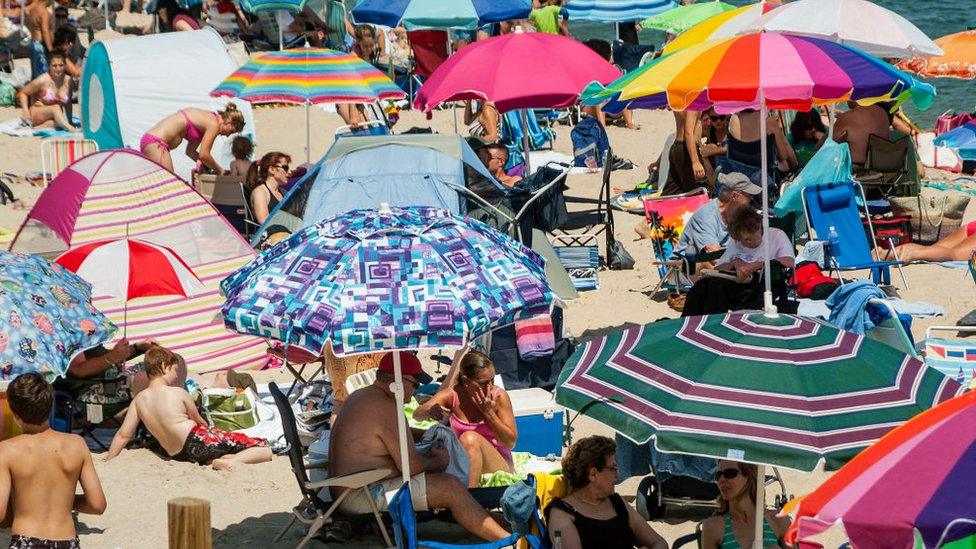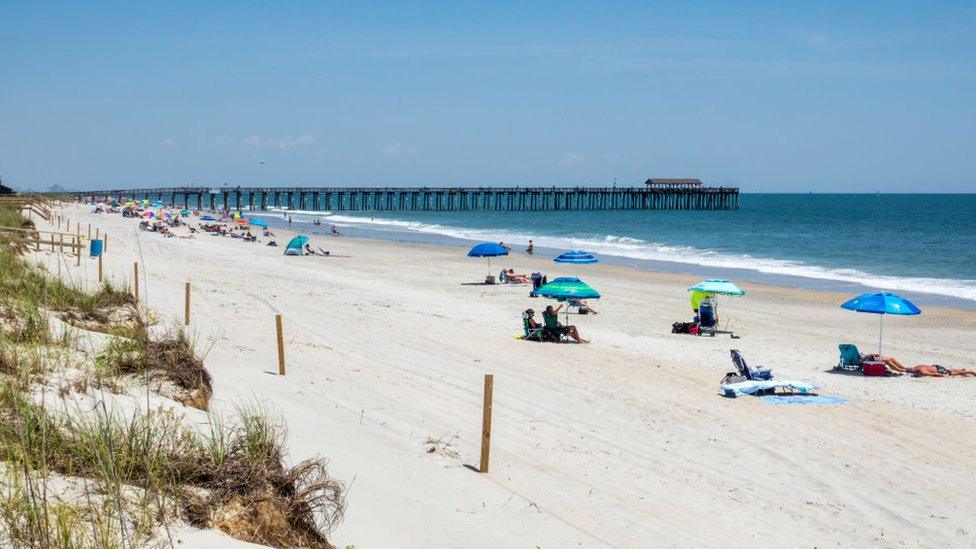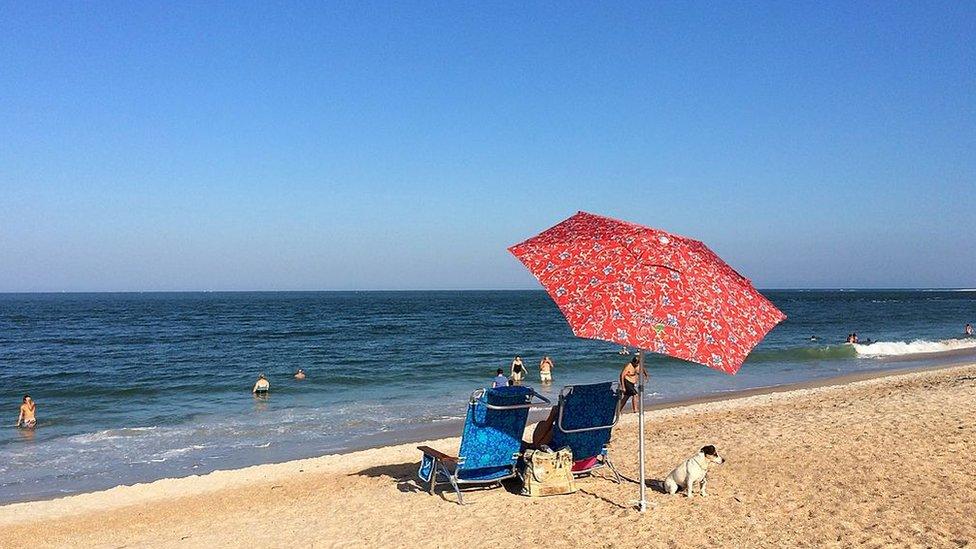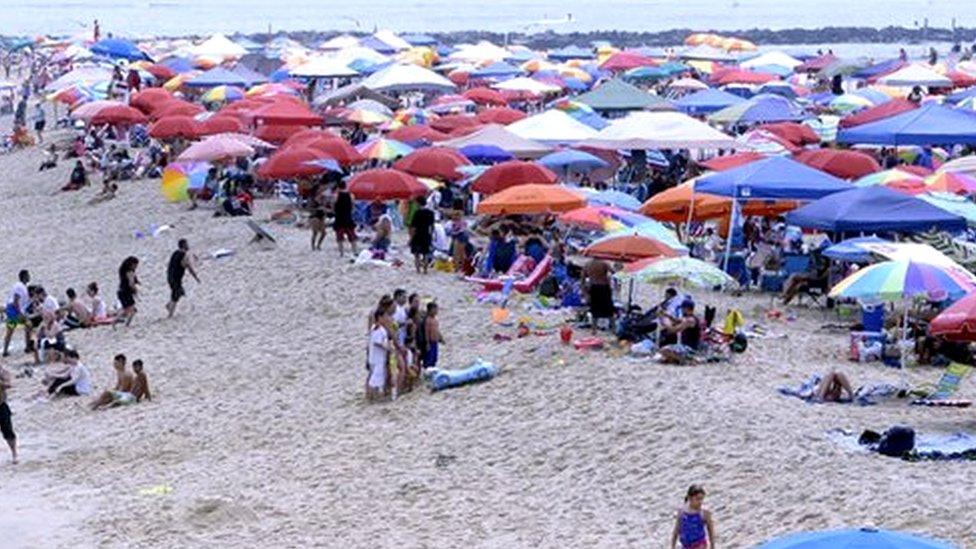Beach-lovers beware: Umbrellas injure thousands a year
- Published

A beach umbrella pierced Ed Quigley's eye and his brain
There is perhaps no better way to spend a summer afternoon than on the beach, under the shade of an umbrella. But a gust of wind can turn fun in the sun into a nightmare for an unfortunate few, as Jonathan Berr explains.
Four years ago, Ed Quigley was celebrating the Fourth of July with his family on Bethany Beach in the US state of Delaware when a beach umbrella flew out of the sand and penetrated his left eye, piercing his brain.
The injury not only damaged his eyesight but the part of his brain that connects to his sense of smell and taste, forever altering his enjoyment of food and wine, one of his lifelong passions.
"When I go to a restaurant, I order what I remember liking," he told the BBC.
Now he devotes himself to spreading the word about umbrella safety.
"I was unaware of the danger before my accident," he said. "Since my accident I have found out there are thousands of injuries per year and most of them aren't reported."
Deadly consequences
Data from the US Consumer Product Safety Commission (CPSC) indicates that more than 31,000 people were treated in hospitals for umbrella-related injuries between 2008 and 2017.
Some of those injuries are relatively minor. This April, radio presenter Chris Demm was hit in the head by a flying umbrella on Myrtle Beach.
"The next thing I knew I was on the sand and the whole left side of my head was just throbbing," he told BBC News, adding that he was standing about 25 feet from the umbrella. "I truly never saw it coming."

Mr Demm was one of the lucky ones. Last year, Londoner Margaret Reynolds was on the beach on the New Jersey shore when a metal umbrella pierced clean-through her ankle. First responders had to remove it with bolt cutters.
In 1999, Phyllis Caliano-Bahaj was struck by an umbrella "like a torpedo", external, while lounging on the beach with her 8-year-old son. She needed 13 stitches and suffered permanent nerve damage to her neck. New York state settled her lawsuit for $200,000 (£158,000) in 2006.
Beach umbrellas have caused at least one death.
In 2016, Lottie Michelle Belk was killed when an errant parasol pierced her torso while she was on holiday in Virginia Beach.
Her death fuelled calls for stricter guidelines around beach umbrella safety.
More scrutiny needed
US Senators Bob Menendez (D-NJ) and Mark Warner (D-VA) have asked the CPSC to provide specific data on beach umbrella injuries in a recent letter to the commission's chair.

They also want the CPSC to make recommendations to make umbrellas safer and issue warnings about dangerous umbrellas.
"As you know, beach umbrellas provide beachgoers the benefits of shade on hot and sunny days at the shore," the senators wrote earlier this year. "Yet, a burst of wind can make these summer accessories harmful to those around them."
The CPSC hasn't yet responded to the senators' letter, which gave the agency until June to respond.
In an email to BBC News, a CPSC spokeswoman said the agency is "aware of the issue and urge consumers to use caution with beach umbrellas." She declined to elaborate further.
Safety in the sun
Many consumers don't properly secure their umbrellas into the sand and don't realise that they are a problem until a gust of wind sends it flying down the beach, according to industry executives.
Different umbrella companies have different approaches to keep umbrellas steady on a windy day.
Some favour using a rocking motion to dig into the sand and secure the parasol with a metal anchor and screws. Others urge consumers to add weight to the umbrella's bottom. A 2016 report from the respected Consumer Reports found both approaches effective.

Bill Schermerhorn, president of beachBub, invented an umbrella base that users fill up with sand to weigh it down.
He says there is no reason a beach umbrella should ever take somebody's life, or cause anyone harm.
"If you are driving in a mountain pass and a boulder rolls down and hits your car, that's a freak accident of nature," he told the BBC. "An umbrella that gets unplanted and goes rolling down the beach... it's more likely the result of somebody not properly putting up a beach umbrella."
- Published23 July 2018

- Published17 July 2018
